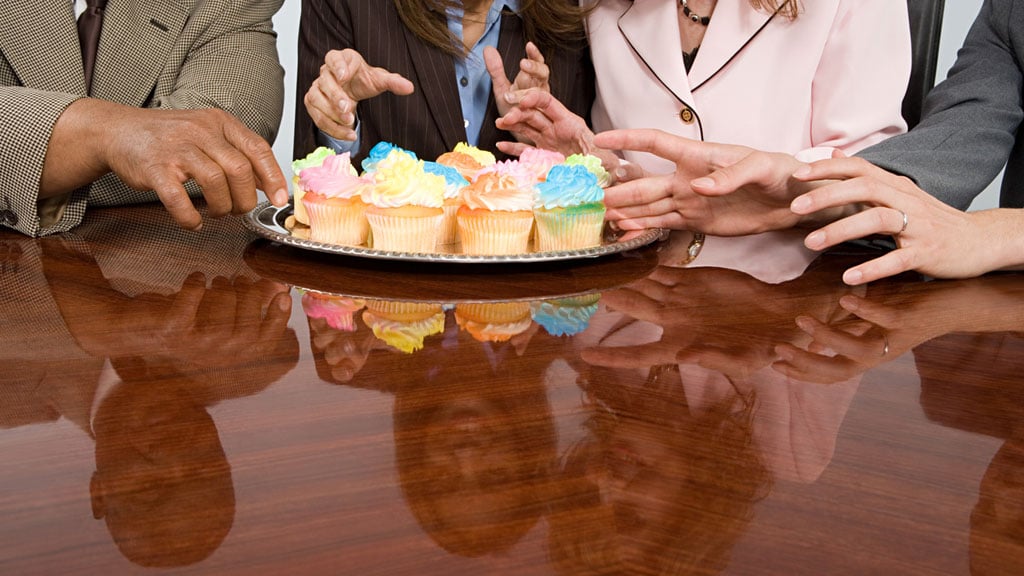Well guys, CareerBuilder asked, and you answered: in a new poll (conducted by Harris Poll and sponsored by CareerBuilder), 50 percent of Washingtonians said they’ve gained weight in their current jobs. In this poll, DC came in second only to Houston, Texas, a.k.a. the land of hearty southern meals and fried food. Also according to the poll: 56 percent of the American workforce thinks they’re overweight, and 25 percent say they’ve gained more than ten pounds in their current positions.
While this is all pretty depressing, the survey also provided information into why people are blaming the extra pounds on. Top of the list? Sitting at a desk all day. Also a factor? Stress eating. While sitting down in front of a computer and stressing about work might be unavoidable for some of us, we reached out to a team of local experts to get their ideas for combating the at-work weight gain. Below, find the most-common reasons the poll respondents listed for their weight gain, and some tips to avoid the extra pounds.
1. Sitting at a desk most of the day (51 percent of respondents)
2. Too tired from work to exercise (45 percent)
3. Eating because of stress (38 percent)
“Work is often stressful, which can lead to emotional eating,” say Allison Tepper, the registered dietician behind Allison Tepper Nutrition Counseling. “Take time for yourself throughout the day, whether it is by taking a short walk, deep breathing, or doing a short meditation to reduce the temptation of reaching for food. I recommend the app Insight Timer for quick meditations to do throughout the day.”
4. No time to exercise before or after work (38 percent)
“When you’re able to do a good, hard workout, that’s great. But on those days and weeks that it’s just not realistic, doing virtually anything will be valuable—that can mean going to the gym for only 15 minutes, instead of a full hour; or just going for a 20 minute brisk walk; or even just getting up from your desk and moving around the office for a couple of minutes,” says Scott Kahan, director of the National Center for Weight and Wellness.
5. Eating out regularly (24 percent)
“Plan ahead. Take one day over the weekend to grocery shop and plan out meals and snacks for the week,” says Tepper. “Choose easy, balanced meals to take to work to decrease eating out, and make sure to stock up on healthy snacks to have at your desk such as fruit, nuts, or granola bars. My go-to granola bars are KIND bars, LARA Bars, RX bars or Kashi Chewy bars. If your weekend is busy, choose ingredients for an easy turkey sandwich that you can make each morning.”
6. Having to skip meals because of time constraints (19 percent)
“One reason for weight gain is meal skipping, which can slow your metabolism and lead to overeating later in the day. Make sure to eat three meals and one to two snacks per day, even when the work day is busy,” says Tepper. “Find easy meals and snacks to incorporate into your day that you can make time for and listen to your hunger cues.”
7. Workplace celebrations (18 percent), the temptation of the office candy jar (16 percent), and pressure to eat food co-workers bring in (8 percent), and happy hours (8 percent)
“First, many of these are related to the food environment—such as having lots of tempting food around the office—and related to feeling pressured to eat when you otherwise wouldn’t—such as when co-workers bring in food, happy hours, workplace celebrations, etc,” says Kahan. “This is where it’s helpful to slowly try to build some boundaries with your co-workers. [Talk] to your colleague who always offers you candy, and communicate that you are working hard to take care of your health and ask for his/her help by trying to keep the candy away; or [let] it be known that you only go to happy hours on Fridays, rather than multiple days a week, or the like. Working with colleagues in the office to come to a shared decision to minimize tempting snacks in office or to agree to bring in healthier foods as options for celebrations can be very helpful as well—after all, it is likely that many other people in your office are struggling with similar difficulties and would appreciate some small changes to make it easier.”



















